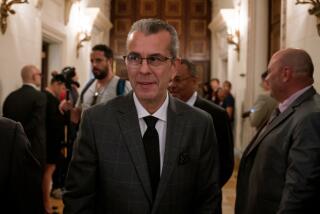Acting President Leads in Armenian Vote
- Share via
YEREVAN, Armenia — First results of a presidential election in Armenia indicated that Robert Kocharyan--the tough, young acting-president--would beat his ex-Communist rival by about 20 percentage points to win control of the tiny former Soviet republic.
But anxiety about allegations of widespread vote-rigging--which, if proved, could jeopardize Armenia’s democratic credentials and future Western aid--kept the atmosphere tense, despite soothing words from Khachatur Bezirdzhyan, head of the Central Electoral Commission.
“During the counting overnight, we did get a lot of calls from precincts about problems. But when we sent people to check them out, no irregularities could be confirmed,” Bezirdzhyan said. Asked what international observers had made of the vote, he answered: “OK. They all thought it was all OK.”
But international observers who flocked to Armenia to ensure that this election would be clean--unlike a series of flawed votes in the years since 1995--had no on-the-record comment to make about Monday’s election as vote-counting dragged on through Tuesday.
They are waiting cautiously until today, when the Organization for Security and Cooperation in Europe, which is heading the operation and criticized a flawed first round of voting in mid-March, is expected to make its statement.
Nor was there any word from Karen S. Demirchyan, Soviet Armenia’s Communist Party boss from 1974 until 1988. According to partial preliminary figures released by the Central Electoral Commission, with 77% of the votes counted, Demirchyan got just under 40% support against Kocharyan’s 60%. He kept out of public gaze all day; when asked when he would appear at his campaign headquarters, an aide answered only, “God only knows.”
Some foreign observers Tuesday denounced the vote as fraudulent. They suggested that ballot boxes had been stuffed by local election officials with extra votes for the acting incumbent, Kocharyan.
Along with reports of ballot boxes with broken seals, they cited extremely high turnout figures for Monday’s runoff vote--in many places, 15 to 20 percentage points higher than in the first round; in one precinct, the second-round turnout was almost 99%, versus 69% in the first. This is a reverse of the usual trend in two-stage elections.
The higher second-round turnout also worked almost exclusively in favor of one candidate--Kocharyan.
“In all my years doing politics, I have never seen this kind of turnout in a second round. . . . The numbers are astounding,” said one Western observer who has lived in Armenia for a year. He added that some voting boxes that he had inspected contained ballots with consecutive numbers folded over in thick sheaves, as though the papers had been inserted together rather than separately.
The high turnout figures were puzzling, as observers and journalists who watched the voting did not see larger numbers of people casting votes Monday than had done so in the first round. Anecdotal evidence suggests that Monday’s turnout was, if anything, slightly lower than that on March 16.
This election was called to replace former President Levon Ter-Petrosyan, who resigned in February. His wish to compromise on a peace settlement between Armenians in the territory of Nagorno-Karabakh and neighboring Azerbaijan, now rich in oil, offended more gung-ho compatriots.
But Ter-Petrosyan had been deeply unpopular since he was reelected in 1996, in a vote so obviously flawed that it brought protesters into the streets; they were scared back into their homes then only by the appearance of tanks in central Yerevan, the capital.
Election experts say, however, that disorder of that kind is unlikely now, even if strong proof was to emerge that the election was stolen. Demirchyan has no solid power base, and, in one expert’s words, “he’s not that kind of fighter.”
Diplomats said before the vote that Armenia, which has a big diaspora in the West and relies heavily on foreign aid and trade, was in a “third-strike” situation and had to demonstrate this time that it had the will to conduct an honest democratic election if it wanted to keep Western money flowing in.
But phlegmatic Armenians in the chilly streets of Yerevan, a poor but bustling city of kebab restaurants and reddish stone houses, only shrugged Tuesday at talk of vote-rigging. They said they have always expected corruption from politicians. As resident Herbert Daghnasaryan put it: “Who knows who really won? What we all know is that Kocharyan is the winner.”
More to Read
Sign up for Essential California
The most important California stories and recommendations in your inbox every morning.
You may occasionally receive promotional content from the Los Angeles Times.













